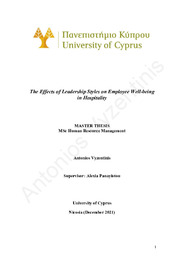| dc.contributor.advisor | Panayiotou, Alexia | en |
| dc.contributor.author | Vyzentinis, Antonios | en |
| dc.coverage.spatial | Cyprus | en |
| dc.creator | Vyzentinis, Antonios | en |
| dc.date.accessioned | 2022-03-29T07:00:02Z | |
| dc.date.available | 2022-03-29T07:00:02Z | |
| dc.date.issued | 2021-12 | |
| dc.identifier.uri | http://gnosis.library.ucy.ac.cy/handle/7/65122 | en |
| dc.description.abstract | Leadership plays a key role in any business, regardless of sector. The leadership styles adopted by managers and general leaders of companies, significantly affect the structure and operation of the company, working relationships and consequently the well-being of employees. All this is directly related to the profitability and the development of the competitive advantage of the company. This paper focuses on examining leadership styles in the well-being of employees in the Hospitality sector in Cyprus. A total of 63 participants participated, who are employees of 4 * and 5 * hotels, of which 42 were men (66.7%), while 21 were women (33.3%). Regarding the instruments for gathering the necessary data, the Global Transformational Leadership Scale (GLT) (Carless et al., 2000), the Empowering Leadership Scale (ELS) (Amundsen & Martinsen, 2014) and the Employee Well-being General Questionnaire (Van Veldhoven & Broersen, 2003) were used. The results showed that there is a positive correlation between Transformational and Empowering leadership style with employee well-being, which indicates that the more managers and leaders generally adopt the aforementioned styles, the higher the well-being rates of employees. The present work is ancillary to the existing scientific research on the subject of leadership styles and how they affect the well-being of employees. In fact, this issue has not been sufficiently studied in Cyprus, something that this work comes to reinforce with its findings. In other words, it comes to emphasize and bring to light the importance of adoption by hotel managers, both of the transformational and empowering leadership style and their practices, in order for employees to feel more satisfied, commitment increasing their well-being. | en |
| dc.language.iso | eng | en |
| dc.publisher | Πανεπιστήμιο Κύπρου, Σχολή Οικονομικών Επιστημών και Διοίκησης / University of Cyprus, Faculty of Economics and Management | |
| dc.rights | Attribution-NonCommercial-NoDerivs 3.0 Greece | * |
| dc.rights | info:eu-repo/semantics/openAccess | en |
| dc.rights | Open Access | en |
| dc.rights.uri | http://creativecommons.org/licenses/by-nc-nd/3.0/gr/ | * |
| dc.title | The effects of leadership styles on employee Well-being in hospitality | en |
| dc.type | info:eu-repo/semantics/masterThesis | en |
| dc.contributor.committeemember | Panayiotou, Alexia | en |
| dc.contributor.department | Τμήμα Διοίκησης Επιχειρήσεων και Δημόσιας Διοίκησης / Department of Business and Public Administration | |
| dc.author.faculty | Σχολή Οικονομικών Επιστημών και Διοίκησης / Faculty of Economics and Management | |
| dc.author.department | Τμήμα Διοίκησης Επιχειρήσεων και Δημόσιας Διοίκησης / Department of Business and Public Administration | |
| dc.type.uhtype | Master Thesis | en |
| dc.contributor.orcid | Panayiotou, Alexia [0000-0001-6351-4883] | |
| dc.gnosis.orcid | 0000-0001-6351-4883 | |


